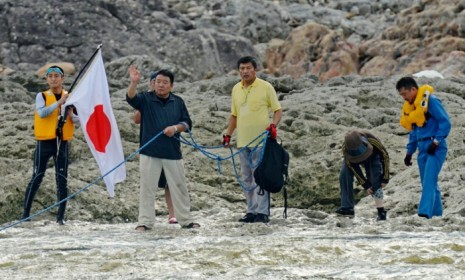Why China and Japan are feuding over tiny islands
Tensions escalate as nationalists from the rival Asian powers stake claims to a remote island chain. What are both sides after?

A free daily email with the biggest news stories of the day – and the best features from TheWeek.com
You are now subscribed
Your newsletter sign-up was successful
A long-simmering territorial dispute is heating up between China and Japan in the East China Sea. Last week, 14 Chinese activists planted Chinese and Taiwanese flags on one of the uninhabited islets, known as "Senkaku" in Japan and "Diaoyu" in China. Then, on Sunday, 10 Japanese demonstrators, including Tokyo city assembly members, swam ashore on one of the islands, triggering anti-Japan riots in China. What is behind this increasingly tense feud? Here, a brief guide:
Why are these islands so important?
The short answer is their location. The chain of small islands is surrounded by rich fishing grounds, as well as important shipping lanes. There are also potentially significant deposits of natural gas beneath the sea floor nearby. But there's another factor, perhaps even more significant, at stake for both countries: Pride. With China facing a critical leadership transition and Japan growing increasingly leery of its larger Asian neighbor's rapid rise, both governments are under pressure to get tough on foreign policy issues, the islands provide the chance to score political points at home.
The Week
Escape your echo chamber. Get the facts behind the news, plus analysis from multiple perspectives.

Sign up for The Week's Free Newsletters
From our morning news briefing to a weekly Good News Newsletter, get the best of The Week delivered directly to your inbox.
From our morning news briefing to a weekly Good News Newsletter, get the best of The Week delivered directly to your inbox.
So whose islands are they?
China says it has had sovereignty over the islands, which are located between Okinawa and Taiwan, since the Ming Dynasty, which began in 1368. The land, however, is internationally recognized as belonging to Japan, which annexed them in 1895. The islands fell under U.S. control after World War II, but were returned to Japan in 1972. Today, China and Japan both say the tiny chain belongs to them.
What caused the latest showdown?
In April, Tokyo's nationalist governor, Shintaro Ishihara, announced his administration's desire to buy several of the islands. Supporters sent in donations, and Chinese nationalists considered the move a slap in the face. On Aug. 15, five of them went ashore and planted Chinese and Taiwanese flags. Japanese authorities detained them, along with nine others who remained in the boat, and promptly deported them to Hong Kong. In response, Japanese activists pulled their own, similar stunt.
A free daily email with the biggest news stories of the day – and the best features from TheWeek.com
What will happen next?
That's anybody's guess. China watchers say this dispute is just part of a broader attempt by Beijing to expand its naval reach across Asia, which has ignited tensions with other Southeast Asian countries, including the Philippines and Vietnam, over similar islands in the South China Sea. But neither China nor Japan seems to have any interest in letting the dispute get out of hand. Japan sounded a conciliatory note after this week's China protests, noting that "the Japan-China relationship is one of the most important bilateral ties for Japan." And China is already trying to discourage anti-Japan demonstrations before they escalate, Hong Kong Baptist University professor Ting Wei tells Bloomberg Businessweek. If protesters get frustrated that the islands remain Japan's, they'll turn their anger on Beijing, which would be "a nightmare" for a government that already has plenty of problems on its hands.
Sources: Bloomberg Businessweek, China Daily, The Guardian, The New York Times, Reuters
-
 6 of the world’s most accessible destinations
6 of the world’s most accessible destinationsThe Week Recommends Experience all of Berlin, Singapore and Sydney
-
 How the FCC’s ‘equal time’ rule works
How the FCC’s ‘equal time’ rule worksIn the Spotlight The law is at the heart of the Colbert-CBS conflict
-
 What is the endgame in the DHS shutdown?
What is the endgame in the DHS shutdown?Today’s Big Question Democrats want to rein in ICE’s immigration crackdown